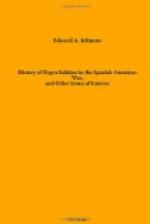That is, the packer has handled $25,000,000 in a single day, and not one dollar has gone astray.
John R. Brown is a hereditary office-holder. His father was a trusted employee of the Treasurer’s office for ten year prior to his death, in 1874. The son was appointed assistant messenger in 1872. He became a clerk through competitive examination and was gradually promoted.
[Illustration: GEN. PIO PILAR, In charge of the Insurgent forces which attacked the American troops.]
The man who has the largest interest in John Brown’s integrity and care probably does not know Brown’s name. Yet, if a thousand dollars was missing from one of the packages in the storage vault, Ellis H. Roberts, Treasurer of the United States, would have to make it good. Mr. Roberts has given a bond to the government in the sum of $500,000. Twenty years hence the sureties on that bond could be held for a shortage in the Treasurer’s office, if it could be traced back to Mr. Roberts’ term.
Not one of the employees under Mr. Roberts gives a bond, though they handle millions every day. But the Treasurer’s office is one which every responsible employee has been weighed carefully. Its clerks have been in service many years and have proved worthy of confidence.
HOWELLS DISCOVERS A NEGRO POET.
Mr. Paul Lawrence Dunbar has been until recently an elevator-boy in Dayton, Ohio. While engaged in the ups and downs of life in that capacity he has cultivated his poetical talents so successfully that his verse has found frequent admission into leading magazines. At last a little collection of these verses reached William Dean Howells, and Mr. Dunbar’s star at once became ascendant. He is said to be a full-blooded Negro, the son of slave-parents, and his best work is in the dialect of his race. A volume of his poems is soon to be published by Dodd, Mead & Co. and in an introduction to it Mr. Howells writes as follows:
“What struck me in reading Mr. Dunbar’s poetry was what had already struck his friends in Ohio and Indiana, in Kentucky and Illinois. They had felt as I felt, that however gifted his race had proven itself in music, in oratory, in several other arts, here was the first instance of an American Negro who had evinced innate literature. In my criticism of his book I had alleged Dumas in France, and had forgotten to allege the far greater Pushkin in Russia; but these were both mulattoes who might have been supposed to derive their qualities from white blood vastly more artistic than ours, and who were the creatures of an environment more favorable to their literary development. So far as I could remember, Paul Dunbar was the only man of pure African blood and American civilization to feel the Negro life esthetically and express it lyrically. It seemed to me that this had come to its most modern consciousness in him, and that his brilliant and unique achievement




